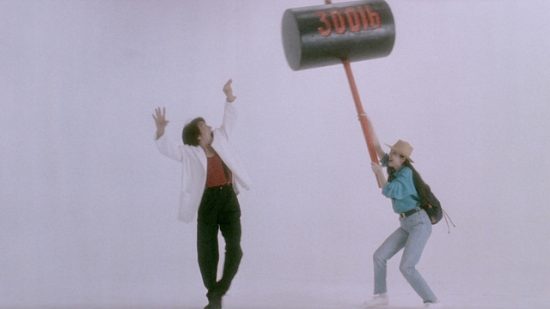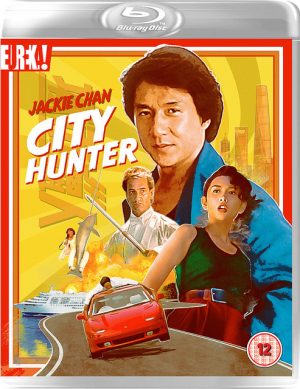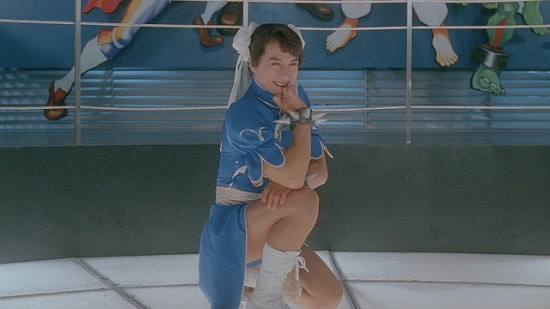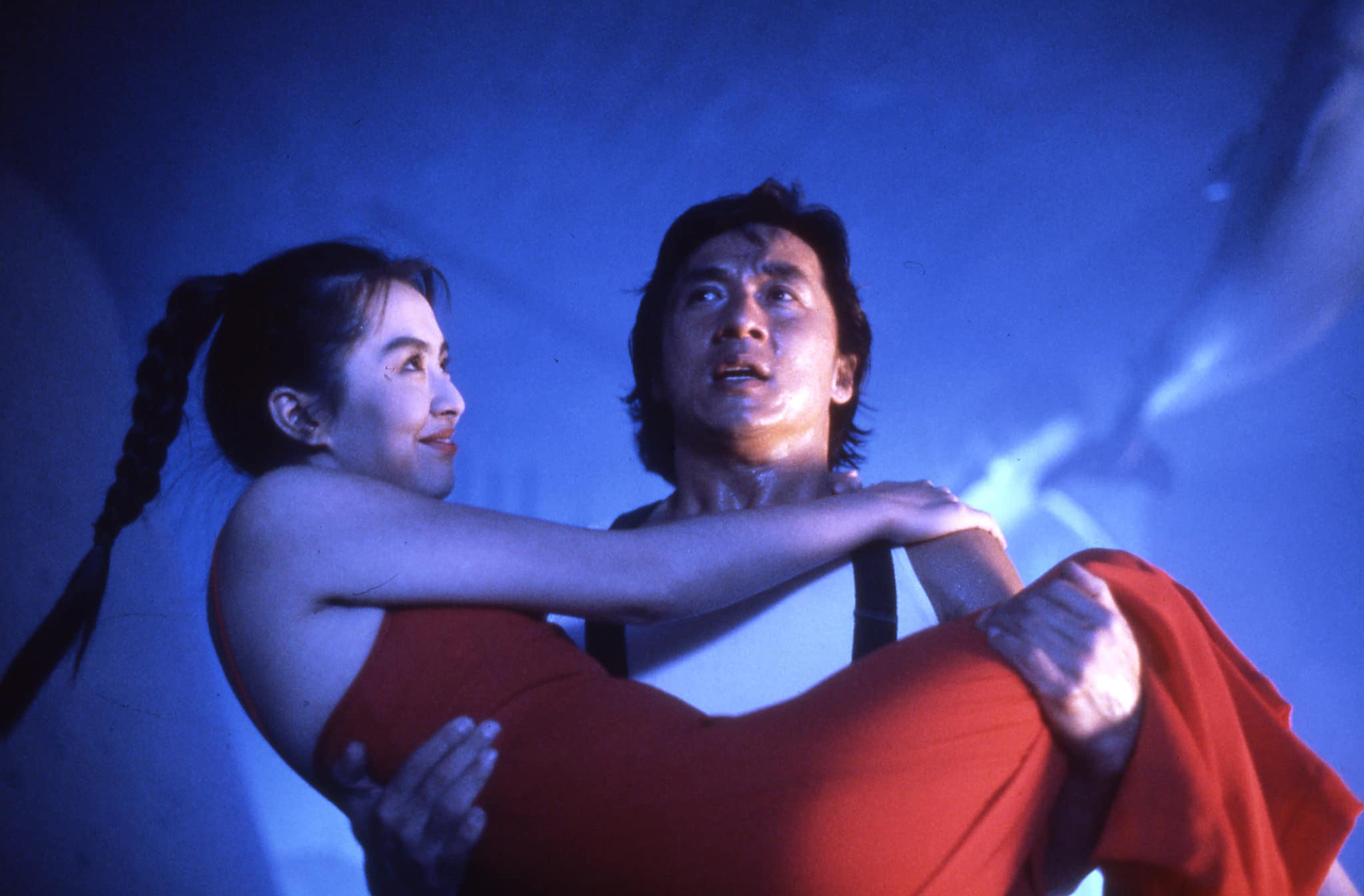 Jackie Chan, as anyone can tell you, pioneered the martial arts action comedy, punctuating awe-inspiring displays of physical daring and expertise with immaculate comic timing and irreverent sensibilities which have resonated with audiences worldwide for decades. From the late 1970s and well into the 80s, Jackie pumped out hit after hit in this format, several of which – notably Drunken Master and the first two Police Story movies – have been recently brought to Blu-ray in the UK by Eureka. However, for their latest hi-def reissue from Jackie’s back catalogue, Eureka bring us the perhaps more surprising selection of City Hunter. Released in early 1993 (immediately after what some might say was Jackie’s true masterpiece, Police Story 3: Supercop) and directed by Wong Jing, it’s a live action adaptation of a Japanese manga series of the same name, which casts the notably-not Japanese leading man as a devil-may-care, womanising private eye hired to find the missing daughter of a newspaper magnate.
Jackie Chan, as anyone can tell you, pioneered the martial arts action comedy, punctuating awe-inspiring displays of physical daring and expertise with immaculate comic timing and irreverent sensibilities which have resonated with audiences worldwide for decades. From the late 1970s and well into the 80s, Jackie pumped out hit after hit in this format, several of which – notably Drunken Master and the first two Police Story movies – have been recently brought to Blu-ray in the UK by Eureka. However, for their latest hi-def reissue from Jackie’s back catalogue, Eureka bring us the perhaps more surprising selection of City Hunter. Released in early 1993 (immediately after what some might say was Jackie’s true masterpiece, Police Story 3: Supercop) and directed by Wong Jing, it’s a live action adaptation of a Japanese manga series of the same name, which casts the notably-not Japanese leading man as a devil-may-care, womanising private eye hired to find the missing daughter of a newspaper magnate.
On paper, Jackie’s signature comedic style and the comic book genre would seem natural bedfellows. However, watching City Hunter I’m reminded of Guillermo del Toro’s lament in the DVD extras of Blade II, of how most filmmakers approaching comic book adaptations, particularly in the 1990s, seemed to “think they’re making movies for retards.” Not unlike Tank Girl, Barb Wire and Joel Schumacher’s Batman films, City Hunter stands to demonstrate just how far comic book movies have come in the years since, as the charming goofiness of Jackie’s best work is cranked up to full capacity in a madcap spectacle which goes out of its way to defy logic, physics, and often the basic laws of coherent filmmaking. As ever, the leading man’s charisma shines through, and some might consider its deliberate cartoonish excess part of the charm; yet in comparison both to Jackie’s classics from the preceding 15 years, and the comic book movies that have come since, it’s hard not to find it all a bit too over-the-top.
 Plot-wise, I’ve pretty much said it all already: Jackie is Ryu Saeba, AKA City Hunter, hot-shot private eye living the boy’s own adventurer dream going on daring missions and residing in a fancy garage filled with guns, cars and motorbikes. All the while he’s tended to by his ward/assistant Kaori (Joey Wang), who, as the film’s prologue tells us, is the younger sister of Ryu’s now dead partner, whose care was entrusted to Ryu on the strict condition that he should never seduce her. This is a question which one would have hoped would go without saying given that Kaori is prepubescent in that prologue scene, yet now that she’s all grown up, the ladykiller PI finds it harder to stick to his word, particularly given that Kaori herself clearly has romantic feelings for him. It’s almost reminiscent of the Hartigan/Nancy storyline from Sin City, only with the older male having seemingly no understanding of why entering into such a relationship would be morally wrong; nor does City Hunter’s eye-widening political incorrectness end there, with numerous instances of men beating up women played for laughs, and a number of overtly homphobic moments including an AIDS joke, all of which leaves me a bit surprised the BBFC have passed the film as a 12.
Plot-wise, I’ve pretty much said it all already: Jackie is Ryu Saeba, AKA City Hunter, hot-shot private eye living the boy’s own adventurer dream going on daring missions and residing in a fancy garage filled with guns, cars and motorbikes. All the while he’s tended to by his ward/assistant Kaori (Joey Wang), who, as the film’s prologue tells us, is the younger sister of Ryu’s now dead partner, whose care was entrusted to Ryu on the strict condition that he should never seduce her. This is a question which one would have hoped would go without saying given that Kaori is prepubescent in that prologue scene, yet now that she’s all grown up, the ladykiller PI finds it harder to stick to his word, particularly given that Kaori herself clearly has romantic feelings for him. It’s almost reminiscent of the Hartigan/Nancy storyline from Sin City, only with the older male having seemingly no understanding of why entering into such a relationship would be morally wrong; nor does City Hunter’s eye-widening political incorrectness end there, with numerous instances of men beating up women played for laughs, and a number of overtly homphobic moments including an AIDS joke, all of which leaves me a bit surprised the BBFC have passed the film as a 12.
Anyway, after a staggeringly overplayed joke about Kaori’s inability to rouse Ryu from his slumber (hence the cover art shot of Jackie lying asleep on top of the red sports car), they accept the assignment to locate the missing heiress Shizuko (Japanse idol of the day Kumiko Goto), who’s run away from home in a standard fit of adolescent rebellion. Ryu first tracks her down in the city (well, he is a City Hunter, after all), where she’s hanging out with a gang of skaters. This leads to a large scale skateboard chase which might have been a major highlight of the film, were it not for the fact that – gasp! – Jackie clearly has a stunt double for the fancier skating tricks. This ultimately leads to Shizuko donning a disguise and seeking refuge on a cruise ship, where, coincidentally, Kaori is also set to take a vacation with a cousin who’s romantically interested in her, just in case there weren’t enough gags to make you feel uncomfortable already. Of course, the City Hunter pursues them on board, and – against the backdrop of yet another staggeringly overplayed joke about Ryu’s inability to find something to eat – it comes to light that the ship is also playing host to western terrorists headed up MacDonald (Richard Norton) and his unnamed, musclebound chief henchman with an era-specific blonde ponytail (Gary Daniels), who have nefarious plans on board. And then there’s the enigmatic bombshell Saeko (Naked Killer star Chingmy Yau) and her equally glamorous unnamed companion (Carol Wan), who appear to be standard pleasure seekers but are secretly highly skilled crime fighters too.
 City Hunter is not without its plus points. As with any Jackie Chan movie, it keeps up a fast pace and packs in plenty of engaging action. Yet the film suffers heavily from a persistent sense of one-upmanship; Jackie’s persona and his body of work was already larger than life, and this film is attempting to be even larger than that. Whereas there’s an almost unassuming charm to some of Jackie’s earlier, smaller scale work, here the sledgehammer subtlety and relentless cartoonishness just gets exhausting, particularly when we get a gratuitous cheesy pop song and dance number midway, and – in what is, for better of worse, the film’s most memorable moment – a scene in which Street Fighter II, then at the peak of its popularity, literally comes to life. Your reaction to this scene – i.e., whether you find it hilarious or wince-inducing – might very well determine how you’ll feel about the film overall.
City Hunter is not without its plus points. As with any Jackie Chan movie, it keeps up a fast pace and packs in plenty of engaging action. Yet the film suffers heavily from a persistent sense of one-upmanship; Jackie’s persona and his body of work was already larger than life, and this film is attempting to be even larger than that. Whereas there’s an almost unassuming charm to some of Jackie’s earlier, smaller scale work, here the sledgehammer subtlety and relentless cartoonishness just gets exhausting, particularly when we get a gratuitous cheesy pop song and dance number midway, and – in what is, for better of worse, the film’s most memorable moment – a scene in which Street Fighter II, then at the peak of its popularity, literally comes to life. Your reaction to this scene – i.e., whether you find it hilarious or wince-inducing – might very well determine how you’ll feel about the film overall.
Jackie himself has openly declared City Hunter one of his least favourites from his oeuvre, and it’s hard not to agree with him. It’s just trying too hard at all turns, and with its often mean-spirited humour it lacks the sense of almost childlike innocence we get from his best work. This probably isn’t helped by the film’s overtly voyeuristic treatment of its female supporting stars, even if Chingmy Yau, Joey Wang and Kumiko Goto are all engaging screen presences in their own right. When all’s said and done, I think the main problem with City Hunter is how little it feels like a Jackie Chan movie. Go back to some of his earlier work – the heavily Buster Keaton-influenced Project A, for example – and it’s clear just how personal this material was to the man himself. Yet City Hunter, with its Manga origins and overt lifts from the broader pop culture (Nintendo, Bond, Die Hard), feels all-too anxious to appeal to the widest possible audience, rather than reflecting its lynchpin’s own sensibilities. As such, it’s hard to view as anything but a misfire.
Even so, if you’re an admirer of City Hunter, you can’t go wrong with this new edition from Eureka; it looks and sounds and great, boasts interviews with the cast and crew plus some behind the scenes material, and the first pressing is accompanied by a limited edition booklet written by James Oliver.
City Hunter is out now on Blu-ray from Eureka Entertainment.
